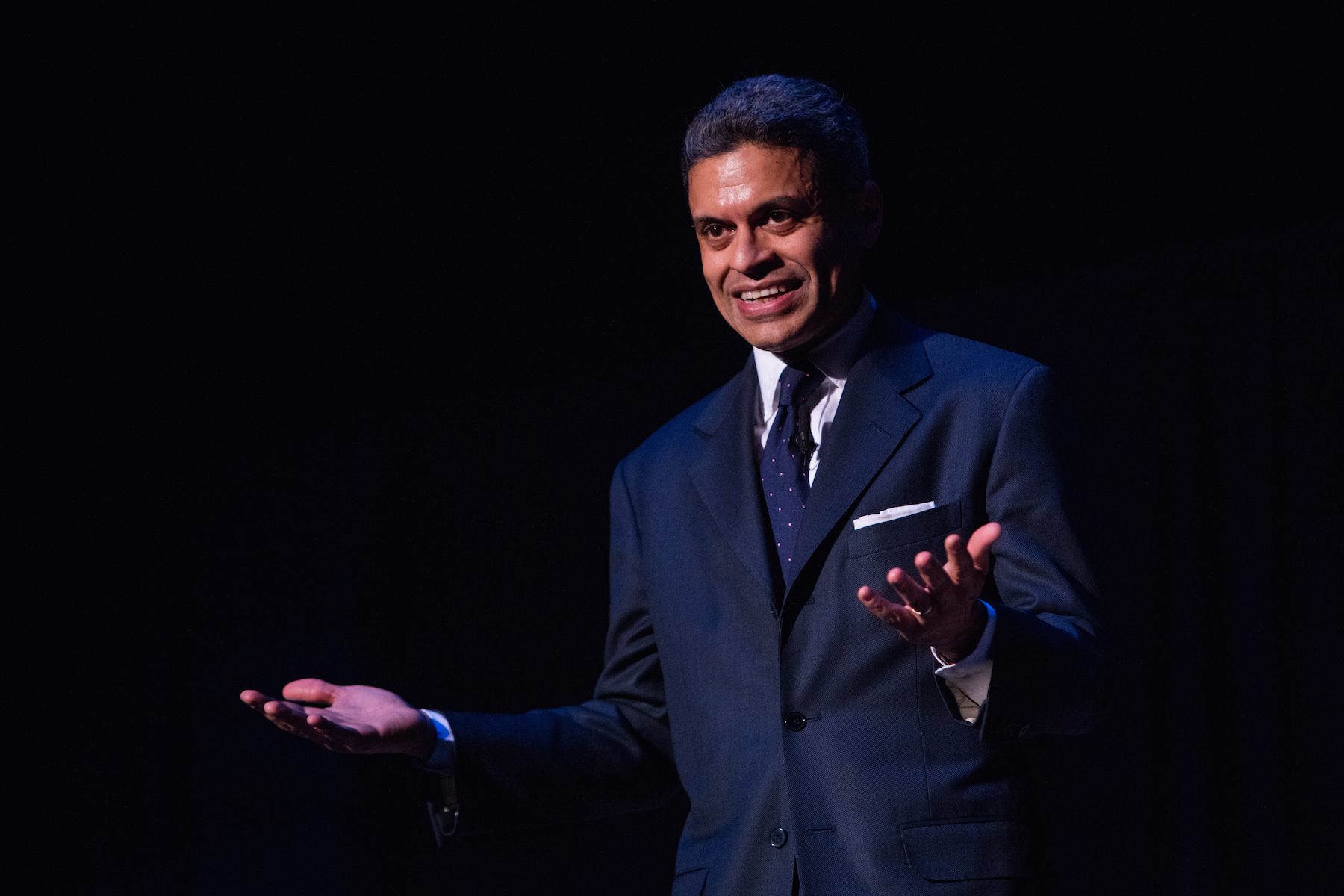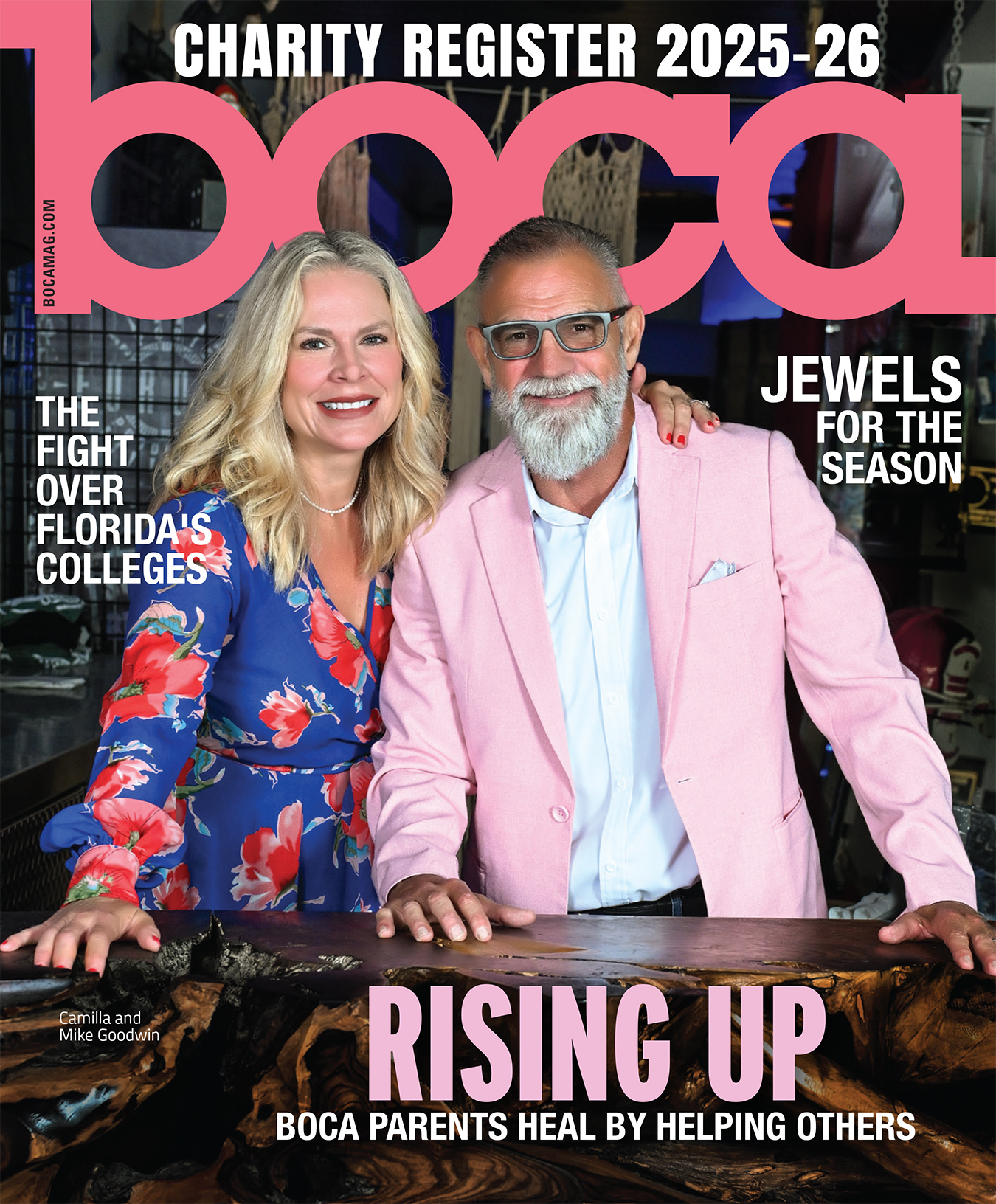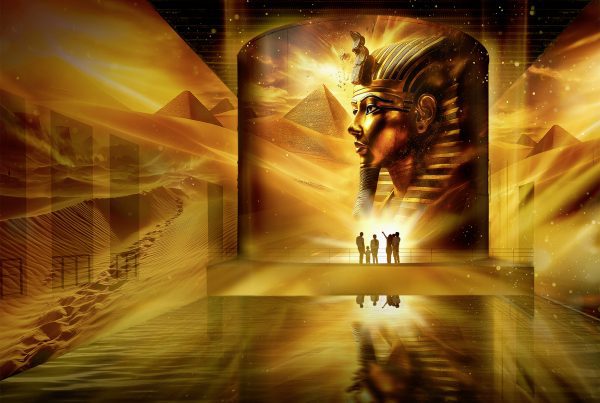 Last night, at Festival of the Arts Boca, Fareed Zakaria schooled us. The crown jewel of the festival’s 2016 Authors & Ideas programming and the host of the smartest public-affairs program on CNN, Zakaria spoke for an hour, extemporaneously and without notes. He opened with a bit of humor, congratulating the jam-packed Mizner Park Amphitheater audience as a “battle-hardened group of policy wonks” who have chosen his lecture instead of “the greatest reality show in American history,” meaning the 2016 presidential race.
Last night, at Festival of the Arts Boca, Fareed Zakaria schooled us. The crown jewel of the festival’s 2016 Authors & Ideas programming and the host of the smartest public-affairs program on CNN, Zakaria spoke for an hour, extemporaneously and without notes. He opened with a bit of humor, congratulating the jam-packed Mizner Park Amphitheater audience as a “battle-hardened group of policy wonks” who have chosen his lecture instead of “the greatest reality show in American history,” meaning the 2016 presidential race.
After a pointed joke about Donald Trump’s recent riff on his own, ahem, manhood—he compared Trump’s gutter verbiage to the famous political axioms of Roosevelt and Kennedy—Zakaria launched into a winding but measured discussion on global trends and America’s future, one that befit his status as an elder statesman of radical centrism in an environment of political polarization. He presented new perspectives on the rise of Islamic extremism—and the inflated threats of such beliefs on American society—the positive global trends bubbling under the service of pessimistic headlines, and the unsung dynamism of the American economy and even our much-maligned political system.
Patriotic without ever being jingoistic, Zakaria’s speech touched our brains and hearts, and accomplished a feat that almost no talking head on television or raging voice on radio has achieved in 20 years of punditry: He made us feel good about the country we live in. Here are a few highlights.

On the fracturing of the Middle East: The East Asian modernization project worked, and the Middle Eastern modernization project failed. Why did it fail? Because what started out with such promise, these new republics made independent from the British and French, ended up morphing into dictatorships very soon. Not only were they politically repressive, but they were economically repressed, corrupt and dysfunctional. What you had was political repression and economic stagnation. Then you had a very strange phenomenon, which was that oil money started gushing in in the 1970s. You’d think it would enrich and modernizing these societies—and it did in a very weird way. It allowed them to buy modernity, consume it, without ever being able to produce it. They could buy the Cadillac—they couldn’t figure out how to make it. That strange kind of modernity reinforced the basic problem in the Middle East, which was that you had a ruling elite that was too powerful and a society that was too underdeveloped.
On the rise of Islam: The one place that Middle Eastern countries could not ban was the mosque. And the one language they could not censor was the language of religion. So all the discontents from these regimes began to channel themselves into the mosque. And Islam became the language of political opposition.
On growing Middle Eastern discontent: The one place where nothing had changed was the Middle East. It’s the one place where you could make the case that actually for Middle Eastern women, being alive in 1995, you were less free politically, economically and socially than you were in 1955. There had actually been regression in this part of the world. That reality is something most young people felt very deeply. And being young, you feel that discontent much more greatly.
The peak year for America’s youth bulge was 1968, the year of maximum social upheaval in the United States. The Middle East is going through a youth bulge of world historical proportions. By some measures, 65 percent of the Middle East is under the age of 30. So these societies are teeming with young people living under this political stagnation and finding, for some of them, a recourse through this language of political opposition and extremism that manifests itself in radical Islam. As the regimes felt this, they pushed back harder. They repressed more. And that made the opposition more extreme and more violent.
The modern-day Islamic terrorist movement has almost all been birthed in the jails of the Middle East. Al Qaeda was born in the jails of Egypt. The current leader was jailed because the group he belonged to, the precursor to al Qaeda, had been banned. ISIS was born in American prisons in Iraq. The head of ISIS was in an American prison camp, and it was there that he met fellow jihadis and some of Saddam Hussein’s old generals, and they formed this unholy alliance that is ISIS.
But it is intersecting with another trend that’s taking place in the Middle East, which is that these regimes turned out to be so repressive that they were very brittle and fragile. Look what has happened as the American invasion of Iraq and the Arab Spring have dislodged so many of these regimes, from Iraq to Libya to Yemen to Syria. What we see is a common pattern: You get rid of the guy at the top, and you scratch, and you notice there’s really no state there. Underneath this guy, there were no administrative institutions that could maintain social order. Then you notice underneath the state, there is no civil society that could maintain political, social cohesion of some kind. And it turns out under that, there’s really no country.
On the formation of the Middle East: These countries were created, arbitrarily and artificially, by the British and French, in 1919, after World War I, almost on the back of a napkin. The city of Mosul, which ISIS now controls, was originally meant to be in Syria. It’s currently the second-largest city in Iraq. The reason it is in Iraq is because the British prime minister, in the conference in 1919, complained to the French president and said, this isn’t fair—Mosul should be in Iraq. We deserve another big city. The president of France said, all right, you can have it. They redrew the line at the table.
When you face that kind of collapse of political order and you do not have deep loyalties to an ancient sense of nationhood, what ends up happening is you need to protect yourself. You need to find some group to protect you. You regress to your older identities that you’re more sure of. Identities that are 1,000 years old, 5,000 years old: as a Shia, as a Sunni, as an Arab, as a Turkman, as a Kurd, as a Syrian. And those identities have reasserted themselves in this political vacuum.
On the threat of radical Islam: We do face a threat. It is real. These organizations mean ill to Americans. But when you combine the realities of the fact that these groups are constantly under pressure—ISIS faces pressure from the Turks, the Iranians, the Russians, the Assad regime, the Jordanians, the Saudis and the US—you have this reality, which is that in the United States since 9-11, the number of people who have been killed by Islamic terrorists is 45. In the same period, the number of people who have died from gun homicides, for example, is 150,000. We live in a world of risks and dangers, and it is equally important, when you think about this kind of danger, to put it in some historical, political perspective—to react but not overreact.
On positive global trends: There is a difference between what makes the headlines and what goes on, day to day, that doesn’t make the headlines. Here’s what hasn’t made the headlines: Latin America is now a continent transformed. In the ‘70s, you could have described it as a land of juntas and dictatorships; it is now by and large a continent of countries that embrace markets and trade and have rejected that old revolutionary past. Net migration from Mexico for the last three years has been zero; if anything it is slightly negative. If you look at Africa, more and more countries have embraced the market, embraced trade, have held elections. If you look at Asia, what is remarkable is how much good news is out there. Even in China, you have a country struggling to find a way to improve its economy, more toward consumers and less toward state involvement. These are all, generally speaking, the kinds of trends we have hoped for in the world. These are the dominant trends.
On America’s recovery from recession: It has been a difficult and complicated time, and the recovery has been both slow and uneven, but ask yourself this: You can compare the United States to some idealized version of what it should be, or you can compare it to every other country in the world, and ask yourself which deck of cards what you rather have? The United States has the most dynamic economy in the world, without question. In the areas and industries of the future, it is totally dominant, probably in a way it has never been before.
America is the only large, rich country in the world that is going to be demographically vibrant—by which I mean a healthy mix of young people who can work hard and earn money and pay taxes, and retirees. In every society, that balance has to be maintained. Everywhere else, you’re in a demographic death spiral of one kind or another. In five years Italy will basically look like Florida. You can’t have a country that is entirely a retiree state. Other European countries are not far behind.
On America as a beacon for the world: The United States takes in 1 million legal immigrants a year. Forget all the noise you’re hearing on the campaign trail. That’s all about illegals. We take in 1 million legal immigrants a year, which is more than the rest of the world put together. We assimilate them well, and that is a crucial reason why the United States is going to be vibrant moving forward.
On our increasing energy independence: Ten years ago, the United States was producing 1 million barrels of oil a day. Today it is producing 9 million barrels of oil a day. Today the United States is the largest producer of liquid hydrocarbons in the world. This is a complete transformation that’s taken place in one decade, and it’s largely a story about technology. We have achieved a kind of high-tech mechanism to extract hydrocarbons from the ground, and that has transformed American industry in many ways.
On U.S. governmental inefficiency: American government actually works better than most people think. We had a test in 2008-2009, almost a Great Recession. The United States has succeeded more than in any other country in the world. This is indisputable. We’re growing twice as fast as Europe, four times as fast as Japan. The United States reacted to the problems fast and early—it fired on all cylinders with monetary stimulus, fiscal stimulus, reform and recapping of the banking sector—and it did it all in four to five months.
When did the United States do this? In the worst possible moment in the American political cycle. What is the easiest moment in which to have the system crack? Let’s have a massive global economic crisis in the last few months of a lame-duck president who has become very unpopular because of a war that went very badly. And let’s have the crisis take place and unfold in the lame-duck three months between the election and inauguration of the new president.
Maybe that’s what the founders wanted: Most of the time, the government does nothing, which is good, and then there’s a momentous crisis in which it springs into action, saves the situation and then goes back to dysfunction and gridlock.
I don’t think this is optimal, but it’s one way to run a country.







